301005 PPC Assignment: Ethical Conduct in Sugar Australia
VerifiedAdded on 2023/06/09
|20
|5773
|445
Report
AI Summary
This report delves into the ethical considerations surrounding the operations of the Australian Sugar Company, focusing on the conflict between economic benefits and environmental impact. It explores arguments supporting the company's operations based on principles like beneficence, nonmaleficence, and justice, as well as ethical theories such as deontology and utilitarianism. Conversely, it examines counter-arguments highlighting the environmental pollution caused by the company and its violation of ethical codes of conduct. The report emphasizes the need for a balanced approach, considering both the economic contributions and the environmental responsibilities of the company, and suggests potential solutions like waste recycling and community engagement. Desklib provides access to similar solved assignments and study tools for students seeking to deepen their understanding of ethical dilemmas in business.
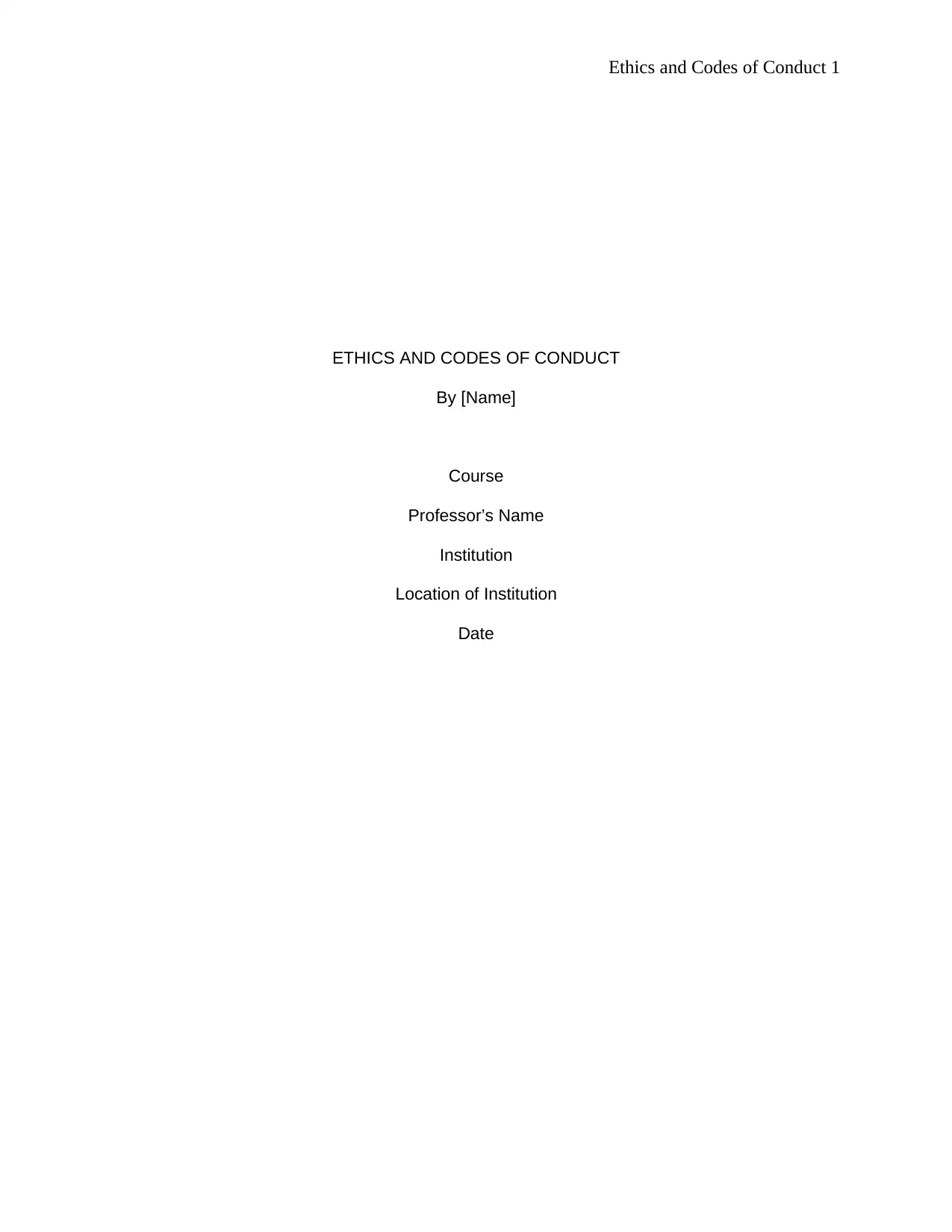
Ethics and Codes of Conduct 1
ETHICS AND CODES OF CONDUCT
By [Name]
Course
Professor’s Name
Institution
Location of Institution
Date
ETHICS AND CODES OF CONDUCT
By [Name]
Course
Professor’s Name
Institution
Location of Institution
Date
Paraphrase This Document
Need a fresh take? Get an instant paraphrase of this document with our AI Paraphraser
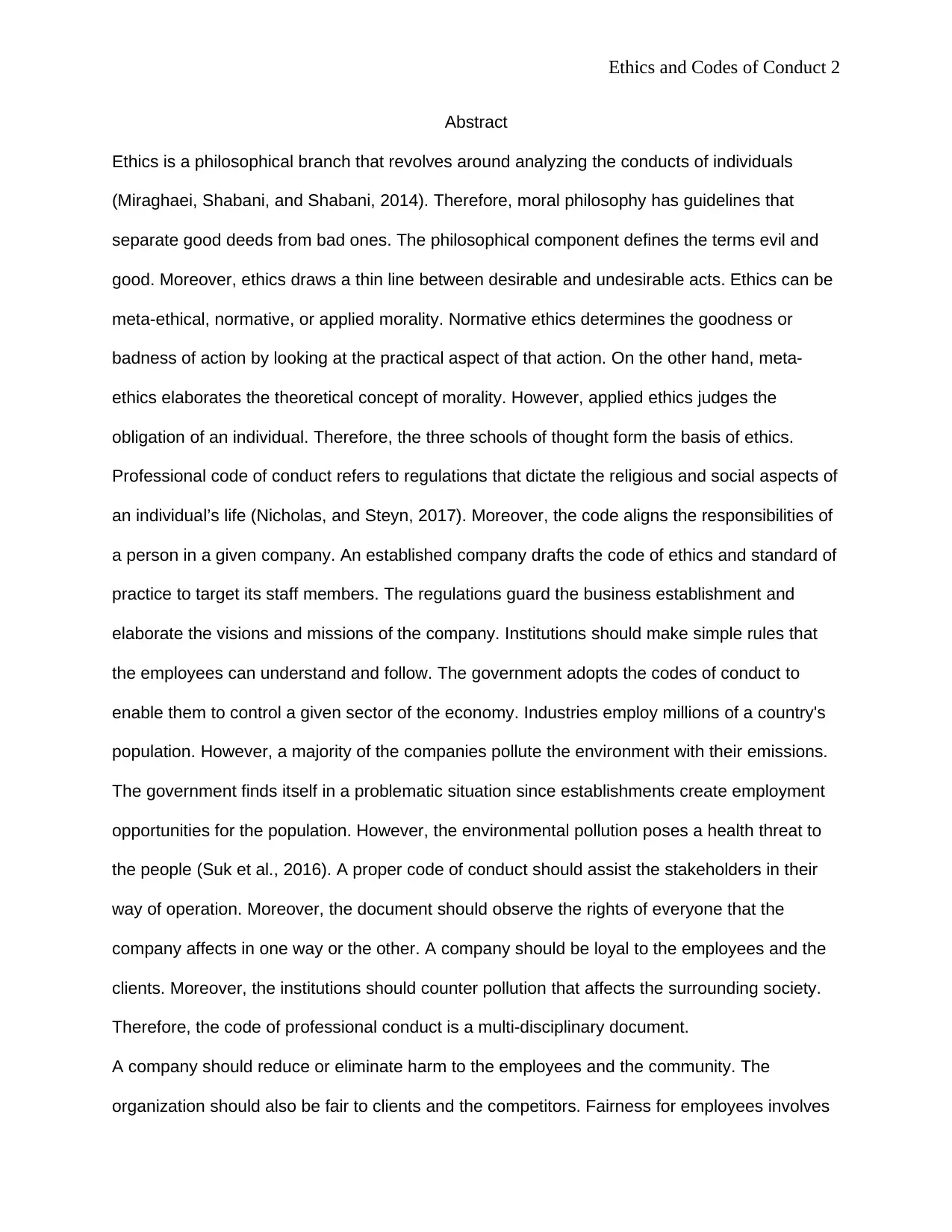
Ethics and Codes of Conduct 2
Abstract
Ethics is a philosophical branch that revolves around analyzing the conducts of individuals
(Miraghaei, Shabani, and Shabani, 2014). Therefore, moral philosophy has guidelines that
separate good deeds from bad ones. The philosophical component defines the terms evil and
good. Moreover, ethics draws a thin line between desirable and undesirable acts. Ethics can be
meta-ethical, normative, or applied morality. Normative ethics determines the goodness or
badness of action by looking at the practical aspect of that action. On the other hand, meta-
ethics elaborates the theoretical concept of morality. However, applied ethics judges the
obligation of an individual. Therefore, the three schools of thought form the basis of ethics.
Professional code of conduct refers to regulations that dictate the religious and social aspects of
an individual’s life (Nicholas, and Steyn, 2017). Moreover, the code aligns the responsibilities of
a person in a given company. An established company drafts the code of ethics and standard of
practice to target its staff members. The regulations guard the business establishment and
elaborate the visions and missions of the company. Institutions should make simple rules that
the employees can understand and follow. The government adopts the codes of conduct to
enable them to control a given sector of the economy. Industries employ millions of a country's
population. However, a majority of the companies pollute the environment with their emissions.
The government finds itself in a problematic situation since establishments create employment
opportunities for the population. However, the environmental pollution poses a health threat to
the people (Suk et al., 2016). A proper code of conduct should assist the stakeholders in their
way of operation. Moreover, the document should observe the rights of everyone that the
company affects in one way or the other. A company should be loyal to the employees and the
clients. Moreover, the institutions should counter pollution that affects the surrounding society.
Therefore, the code of professional conduct is a multi-disciplinary document.
A company should reduce or eliminate harm to the employees and the community. The
organization should also be fair to clients and the competitors. Fairness for employees involves
Abstract
Ethics is a philosophical branch that revolves around analyzing the conducts of individuals
(Miraghaei, Shabani, and Shabani, 2014). Therefore, moral philosophy has guidelines that
separate good deeds from bad ones. The philosophical component defines the terms evil and
good. Moreover, ethics draws a thin line between desirable and undesirable acts. Ethics can be
meta-ethical, normative, or applied morality. Normative ethics determines the goodness or
badness of action by looking at the practical aspect of that action. On the other hand, meta-
ethics elaborates the theoretical concept of morality. However, applied ethics judges the
obligation of an individual. Therefore, the three schools of thought form the basis of ethics.
Professional code of conduct refers to regulations that dictate the religious and social aspects of
an individual’s life (Nicholas, and Steyn, 2017). Moreover, the code aligns the responsibilities of
a person in a given company. An established company drafts the code of ethics and standard of
practice to target its staff members. The regulations guard the business establishment and
elaborate the visions and missions of the company. Institutions should make simple rules that
the employees can understand and follow. The government adopts the codes of conduct to
enable them to control a given sector of the economy. Industries employ millions of a country's
population. However, a majority of the companies pollute the environment with their emissions.
The government finds itself in a problematic situation since establishments create employment
opportunities for the population. However, the environmental pollution poses a health threat to
the people (Suk et al., 2016). A proper code of conduct should assist the stakeholders in their
way of operation. Moreover, the document should observe the rights of everyone that the
company affects in one way or the other. A company should be loyal to the employees and the
clients. Moreover, the institutions should counter pollution that affects the surrounding society.
Therefore, the code of professional conduct is a multi-disciplinary document.
A company should reduce or eliminate harm to the employees and the community. The
organization should also be fair to clients and the competitors. Fairness for employees involves
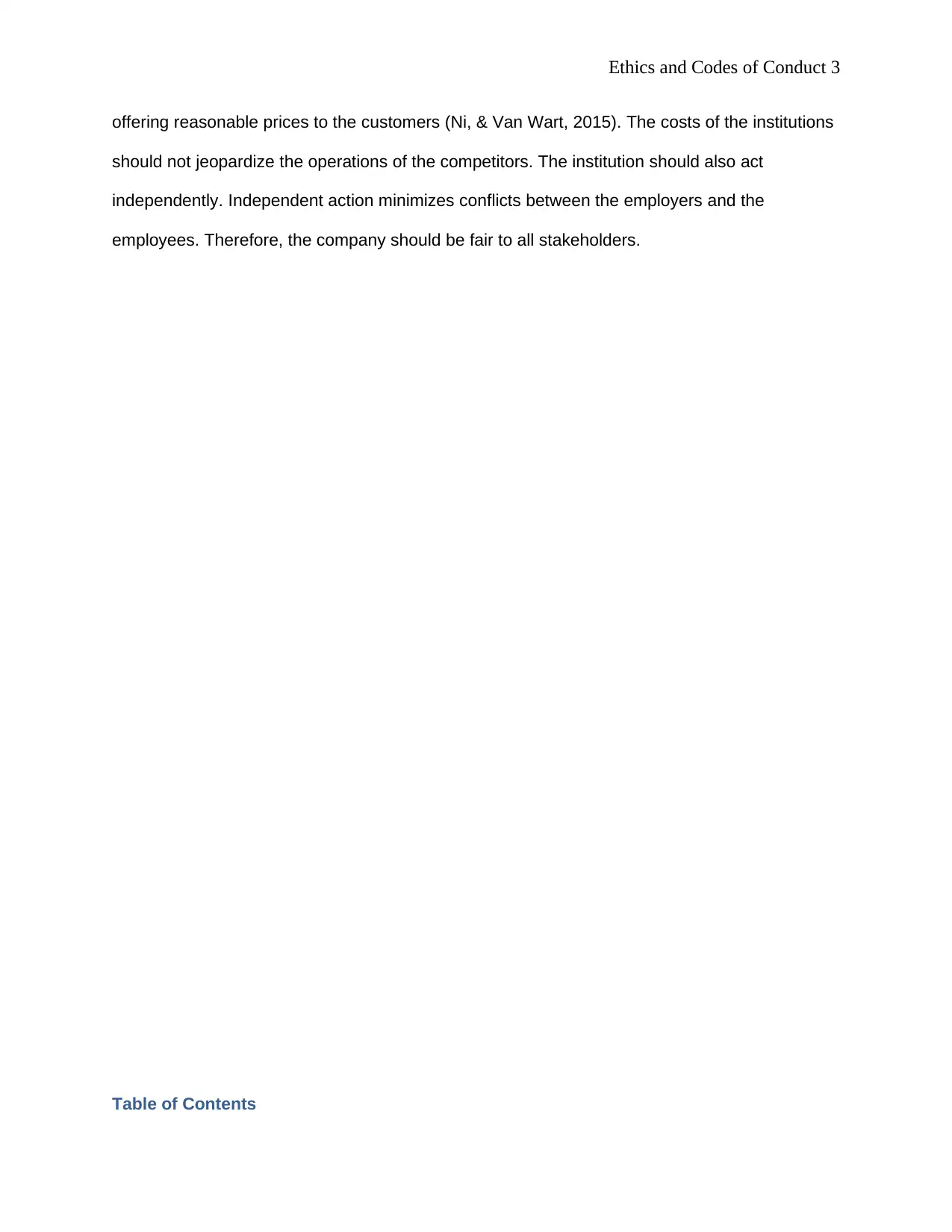
Ethics and Codes of Conduct 3
offering reasonable prices to the customers (Ni, & Van Wart, 2015). The costs of the institutions
should not jeopardize the operations of the competitors. The institution should also act
independently. Independent action minimizes conflicts between the employers and the
employees. Therefore, the company should be fair to all stakeholders.
Table of Contents
offering reasonable prices to the customers (Ni, & Van Wart, 2015). The costs of the institutions
should not jeopardize the operations of the competitors. The institution should also act
independently. Independent action minimizes conflicts between the employers and the
employees. Therefore, the company should be fair to all stakeholders.
Table of Contents
⊘ This is a preview!⊘
Do you want full access?
Subscribe today to unlock all pages.

Trusted by 1+ million students worldwide
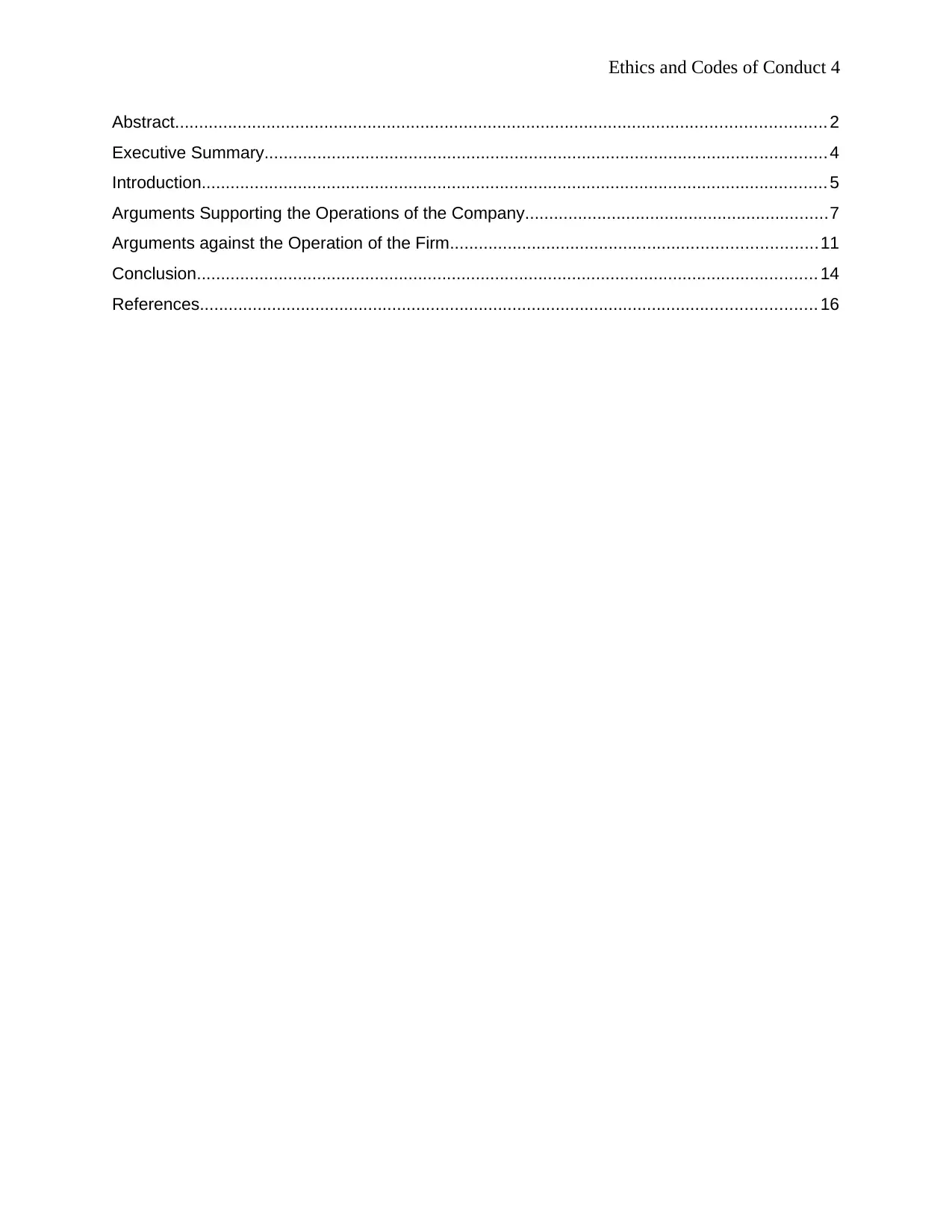
Ethics and Codes of Conduct 4
Abstract....................................................................................................................................... 2
Executive Summary..................................................................................................................... 4
Introduction.................................................................................................................................. 5
Arguments Supporting the Operations of the Company...............................................................7
Arguments against the Operation of the Firm............................................................................11
Conclusion................................................................................................................................. 14
References................................................................................................................................ 16
Abstract....................................................................................................................................... 2
Executive Summary..................................................................................................................... 4
Introduction.................................................................................................................................. 5
Arguments Supporting the Operations of the Company...............................................................7
Arguments against the Operation of the Firm............................................................................11
Conclusion................................................................................................................................. 14
References................................................................................................................................ 16
Paraphrase This Document
Need a fresh take? Get an instant paraphrase of this document with our AI Paraphraser
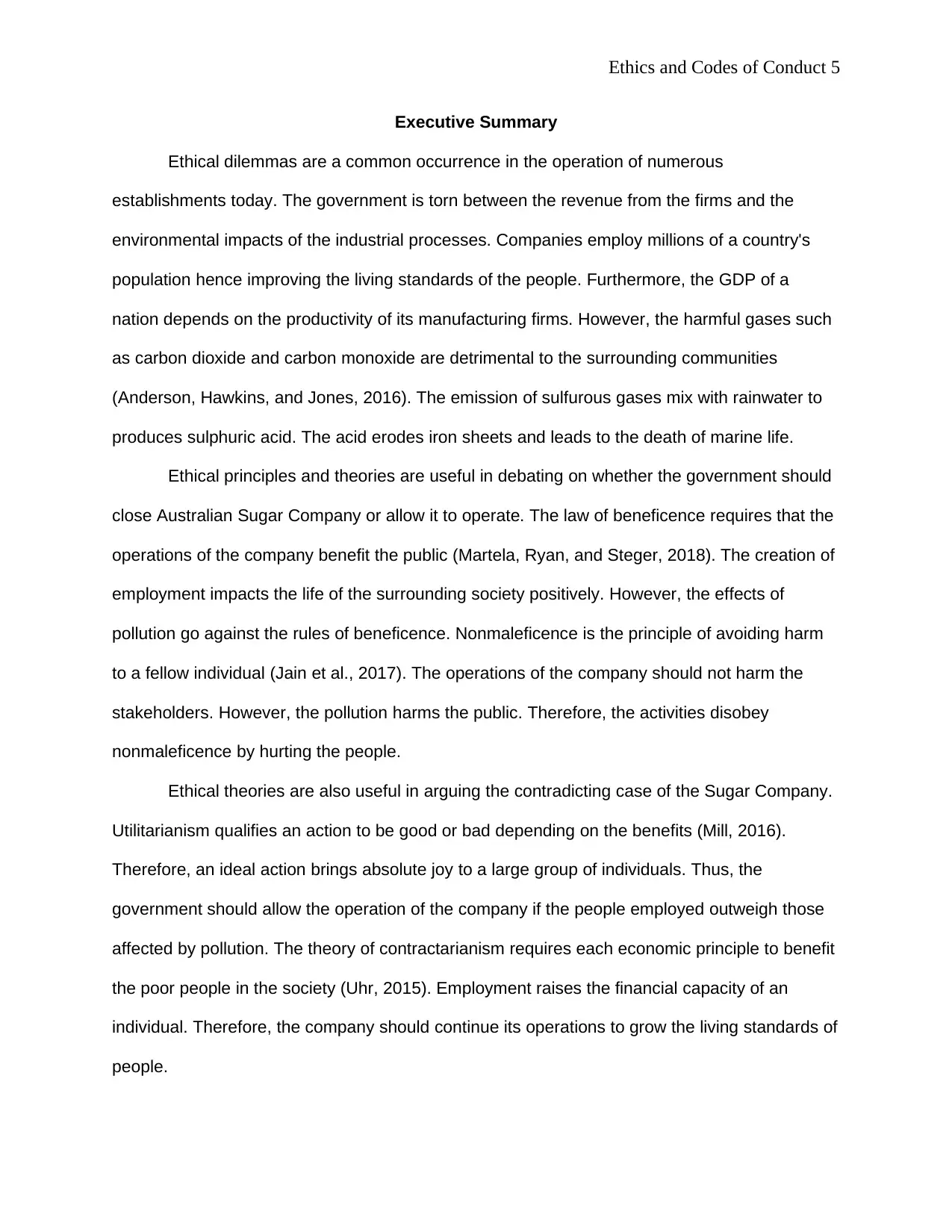
Ethics and Codes of Conduct 5
Executive Summary
Ethical dilemmas are a common occurrence in the operation of numerous
establishments today. The government is torn between the revenue from the firms and the
environmental impacts of the industrial processes. Companies employ millions of a country's
population hence improving the living standards of the people. Furthermore, the GDP of a
nation depends on the productivity of its manufacturing firms. However, the harmful gases such
as carbon dioxide and carbon monoxide are detrimental to the surrounding communities
(Anderson, Hawkins, and Jones, 2016). The emission of sulfurous gases mix with rainwater to
produces sulphuric acid. The acid erodes iron sheets and leads to the death of marine life.
Ethical principles and theories are useful in debating on whether the government should
close Australian Sugar Company or allow it to operate. The law of beneficence requires that the
operations of the company benefit the public (Martela, Ryan, and Steger, 2018). The creation of
employment impacts the life of the surrounding society positively. However, the effects of
pollution go against the rules of beneficence. Nonmaleficence is the principle of avoiding harm
to a fellow individual (Jain et al., 2017). The operations of the company should not harm the
stakeholders. However, the pollution harms the public. Therefore, the activities disobey
nonmaleficence by hurting the people.
Ethical theories are also useful in arguing the contradicting case of the Sugar Company.
Utilitarianism qualifies an action to be good or bad depending on the benefits (Mill, 2016).
Therefore, an ideal action brings absolute joy to a large group of individuals. Thus, the
government should allow the operation of the company if the people employed outweigh those
affected by pollution. The theory of contractarianism requires each economic principle to benefit
the poor people in the society (Uhr, 2015). Employment raises the financial capacity of an
individual. Therefore, the company should continue its operations to grow the living standards of
people.
Executive Summary
Ethical dilemmas are a common occurrence in the operation of numerous
establishments today. The government is torn between the revenue from the firms and the
environmental impacts of the industrial processes. Companies employ millions of a country's
population hence improving the living standards of the people. Furthermore, the GDP of a
nation depends on the productivity of its manufacturing firms. However, the harmful gases such
as carbon dioxide and carbon monoxide are detrimental to the surrounding communities
(Anderson, Hawkins, and Jones, 2016). The emission of sulfurous gases mix with rainwater to
produces sulphuric acid. The acid erodes iron sheets and leads to the death of marine life.
Ethical principles and theories are useful in debating on whether the government should
close Australian Sugar Company or allow it to operate. The law of beneficence requires that the
operations of the company benefit the public (Martela, Ryan, and Steger, 2018). The creation of
employment impacts the life of the surrounding society positively. However, the effects of
pollution go against the rules of beneficence. Nonmaleficence is the principle of avoiding harm
to a fellow individual (Jain et al., 2017). The operations of the company should not harm the
stakeholders. However, the pollution harms the public. Therefore, the activities disobey
nonmaleficence by hurting the people.
Ethical theories are also useful in arguing the contradicting case of the Sugar Company.
Utilitarianism qualifies an action to be good or bad depending on the benefits (Mill, 2016).
Therefore, an ideal action brings absolute joy to a large group of individuals. Thus, the
government should allow the operation of the company if the people employed outweigh those
affected by pollution. The theory of contractarianism requires each economic principle to benefit
the poor people in the society (Uhr, 2015). Employment raises the financial capacity of an
individual. Therefore, the company should continue its operations to grow the living standards of
people.
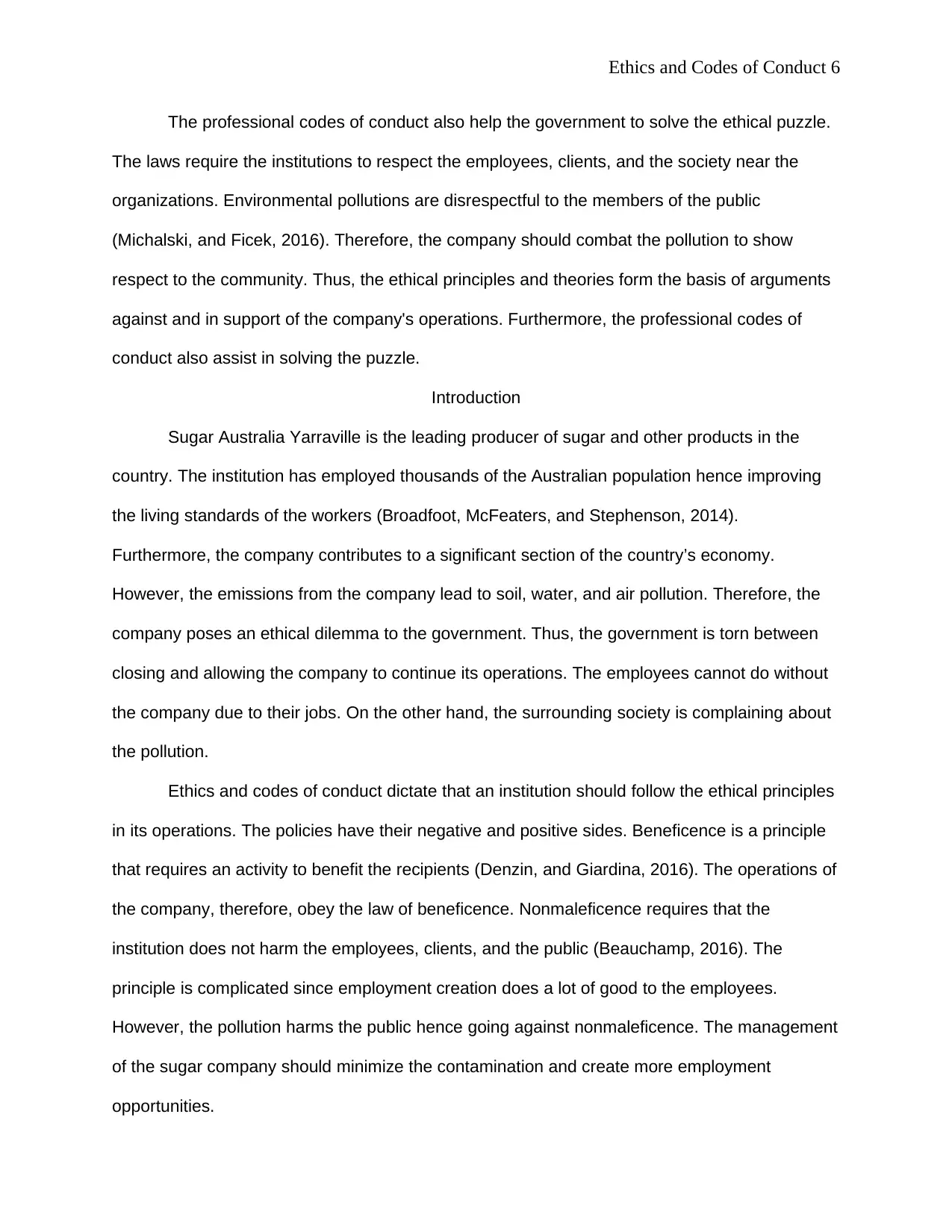
Ethics and Codes of Conduct 6
The professional codes of conduct also help the government to solve the ethical puzzle.
The laws require the institutions to respect the employees, clients, and the society near the
organizations. Environmental pollutions are disrespectful to the members of the public
(Michalski, and Ficek, 2016). Therefore, the company should combat the pollution to show
respect to the community. Thus, the ethical principles and theories form the basis of arguments
against and in support of the company's operations. Furthermore, the professional codes of
conduct also assist in solving the puzzle.
Introduction
Sugar Australia Yarraville is the leading producer of sugar and other products in the
country. The institution has employed thousands of the Australian population hence improving
the living standards of the workers (Broadfoot, McFeaters, and Stephenson, 2014).
Furthermore, the company contributes to a significant section of the country’s economy.
However, the emissions from the company lead to soil, water, and air pollution. Therefore, the
company poses an ethical dilemma to the government. Thus, the government is torn between
closing and allowing the company to continue its operations. The employees cannot do without
the company due to their jobs. On the other hand, the surrounding society is complaining about
the pollution.
Ethics and codes of conduct dictate that an institution should follow the ethical principles
in its operations. The policies have their negative and positive sides. Beneficence is a principle
that requires an activity to benefit the recipients (Denzin, and Giardina, 2016). The operations of
the company, therefore, obey the law of beneficence. Nonmaleficence requires that the
institution does not harm the employees, clients, and the public (Beauchamp, 2016). The
principle is complicated since employment creation does a lot of good to the employees.
However, the pollution harms the public hence going against nonmaleficence. The management
of the sugar company should minimize the contamination and create more employment
opportunities.
The professional codes of conduct also help the government to solve the ethical puzzle.
The laws require the institutions to respect the employees, clients, and the society near the
organizations. Environmental pollutions are disrespectful to the members of the public
(Michalski, and Ficek, 2016). Therefore, the company should combat the pollution to show
respect to the community. Thus, the ethical principles and theories form the basis of arguments
against and in support of the company's operations. Furthermore, the professional codes of
conduct also assist in solving the puzzle.
Introduction
Sugar Australia Yarraville is the leading producer of sugar and other products in the
country. The institution has employed thousands of the Australian population hence improving
the living standards of the workers (Broadfoot, McFeaters, and Stephenson, 2014).
Furthermore, the company contributes to a significant section of the country’s economy.
However, the emissions from the company lead to soil, water, and air pollution. Therefore, the
company poses an ethical dilemma to the government. Thus, the government is torn between
closing and allowing the company to continue its operations. The employees cannot do without
the company due to their jobs. On the other hand, the surrounding society is complaining about
the pollution.
Ethics and codes of conduct dictate that an institution should follow the ethical principles
in its operations. The policies have their negative and positive sides. Beneficence is a principle
that requires an activity to benefit the recipients (Denzin, and Giardina, 2016). The operations of
the company, therefore, obey the law of beneficence. Nonmaleficence requires that the
institution does not harm the employees, clients, and the public (Beauchamp, 2016). The
principle is complicated since employment creation does a lot of good to the employees.
However, the pollution harms the public hence going against nonmaleficence. The management
of the sugar company should minimize the contamination and create more employment
opportunities.
⊘ This is a preview!⊘
Do you want full access?
Subscribe today to unlock all pages.

Trusted by 1+ million students worldwide
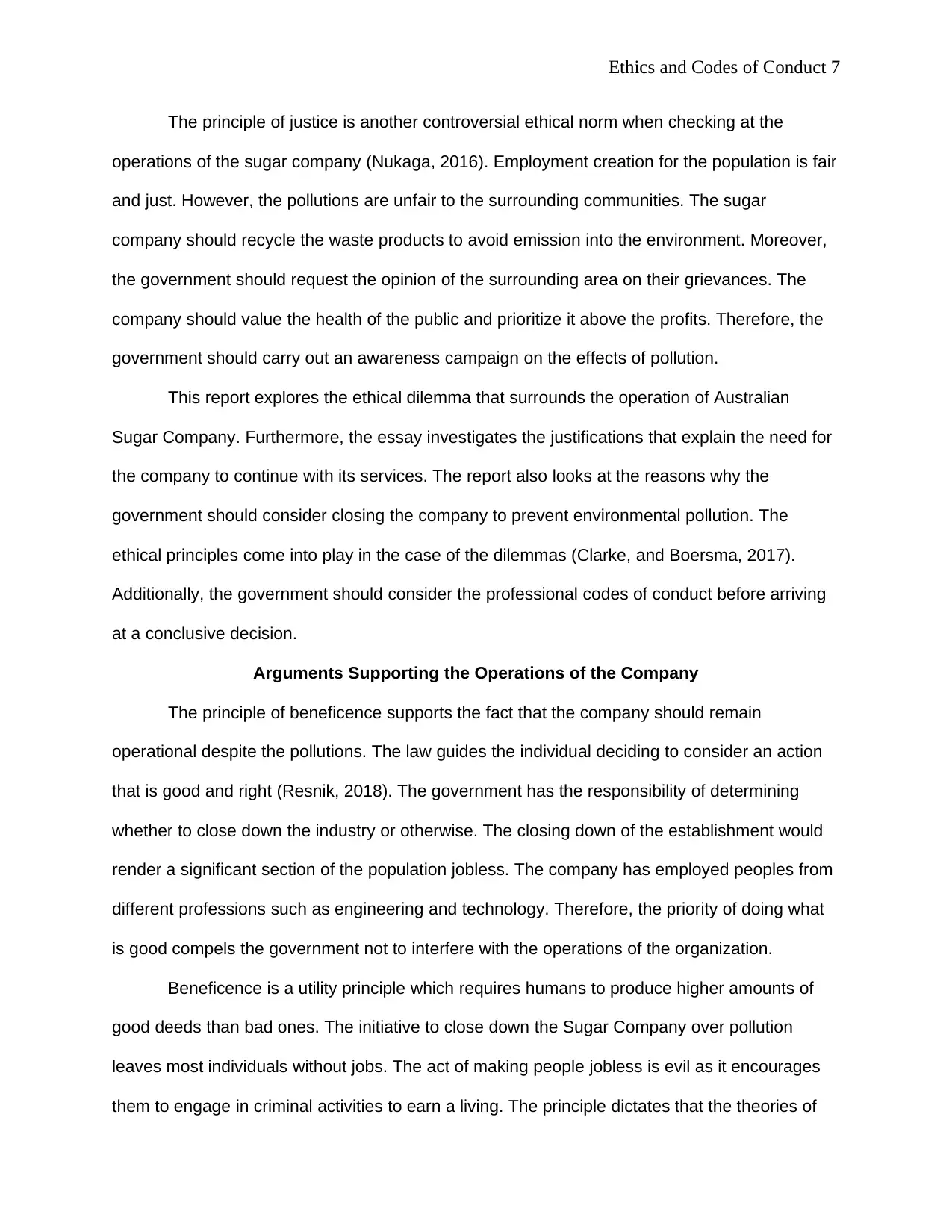
Ethics and Codes of Conduct 7
The principle of justice is another controversial ethical norm when checking at the
operations of the sugar company (Nukaga, 2016). Employment creation for the population is fair
and just. However, the pollutions are unfair to the surrounding communities. The sugar
company should recycle the waste products to avoid emission into the environment. Moreover,
the government should request the opinion of the surrounding area on their grievances. The
company should value the health of the public and prioritize it above the profits. Therefore, the
government should carry out an awareness campaign on the effects of pollution.
This report explores the ethical dilemma that surrounds the operation of Australian
Sugar Company. Furthermore, the essay investigates the justifications that explain the need for
the company to continue with its services. The report also looks at the reasons why the
government should consider closing the company to prevent environmental pollution. The
ethical principles come into play in the case of the dilemmas (Clarke, and Boersma, 2017).
Additionally, the government should consider the professional codes of conduct before arriving
at a conclusive decision.
Arguments Supporting the Operations of the Company
The principle of beneficence supports the fact that the company should remain
operational despite the pollutions. The law guides the individual deciding to consider an action
that is good and right (Resnik, 2018). The government has the responsibility of determining
whether to close down the industry or otherwise. The closing down of the establishment would
render a significant section of the population jobless. The company has employed peoples from
different professions such as engineering and technology. Therefore, the priority of doing what
is good compels the government not to interfere with the operations of the organization.
Beneficence is a utility principle which requires humans to produce higher amounts of
good deeds than bad ones. The initiative to close down the Sugar Company over pollution
leaves most individuals without jobs. The act of making people jobless is evil as it encourages
them to engage in criminal activities to earn a living. The principle dictates that the theories of
The principle of justice is another controversial ethical norm when checking at the
operations of the sugar company (Nukaga, 2016). Employment creation for the population is fair
and just. However, the pollutions are unfair to the surrounding communities. The sugar
company should recycle the waste products to avoid emission into the environment. Moreover,
the government should request the opinion of the surrounding area on their grievances. The
company should value the health of the public and prioritize it above the profits. Therefore, the
government should carry out an awareness campaign on the effects of pollution.
This report explores the ethical dilemma that surrounds the operation of Australian
Sugar Company. Furthermore, the essay investigates the justifications that explain the need for
the company to continue with its services. The report also looks at the reasons why the
government should consider closing the company to prevent environmental pollution. The
ethical principles come into play in the case of the dilemmas (Clarke, and Boersma, 2017).
Additionally, the government should consider the professional codes of conduct before arriving
at a conclusive decision.
Arguments Supporting the Operations of the Company
The principle of beneficence supports the fact that the company should remain
operational despite the pollutions. The law guides the individual deciding to consider an action
that is good and right (Resnik, 2018). The government has the responsibility of determining
whether to close down the industry or otherwise. The closing down of the establishment would
render a significant section of the population jobless. The company has employed peoples from
different professions such as engineering and technology. Therefore, the priority of doing what
is good compels the government not to interfere with the operations of the organization.
Beneficence is a utility principle which requires humans to produce higher amounts of
good deeds than bad ones. The initiative to close down the Sugar Company over pollution
leaves most individuals without jobs. The act of making people jobless is evil as it encourages
them to engage in criminal activities to earn a living. The principle dictates that the theories of
Paraphrase This Document
Need a fresh take? Get an instant paraphrase of this document with our AI Paraphraser
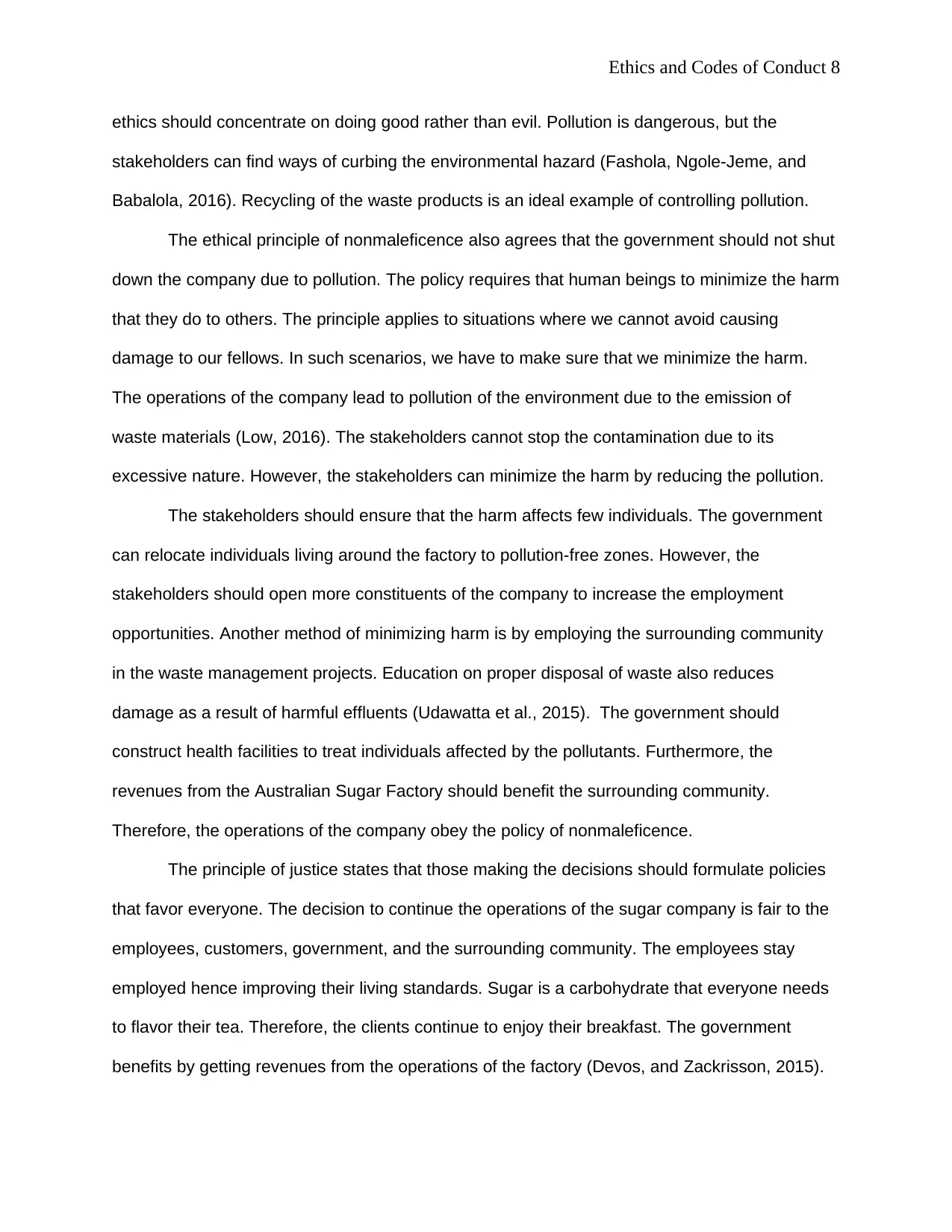
Ethics and Codes of Conduct 8
ethics should concentrate on doing good rather than evil. Pollution is dangerous, but the
stakeholders can find ways of curbing the environmental hazard (Fashola, Ngole-Jeme, and
Babalola, 2016). Recycling of the waste products is an ideal example of controlling pollution.
The ethical principle of nonmaleficence also agrees that the government should not shut
down the company due to pollution. The policy requires that human beings to minimize the harm
that they do to others. The principle applies to situations where we cannot avoid causing
damage to our fellows. In such scenarios, we have to make sure that we minimize the harm.
The operations of the company lead to pollution of the environment due to the emission of
waste materials (Low, 2016). The stakeholders cannot stop the contamination due to its
excessive nature. However, the stakeholders can minimize the harm by reducing the pollution.
The stakeholders should ensure that the harm affects few individuals. The government
can relocate individuals living around the factory to pollution-free zones. However, the
stakeholders should open more constituents of the company to increase the employment
opportunities. Another method of minimizing harm is by employing the surrounding community
in the waste management projects. Education on proper disposal of waste also reduces
damage as a result of harmful effluents (Udawatta et al., 2015). The government should
construct health facilities to treat individuals affected by the pollutants. Furthermore, the
revenues from the Australian Sugar Factory should benefit the surrounding community.
Therefore, the operations of the company obey the policy of nonmaleficence.
The principle of justice states that those making the decisions should formulate policies
that favor everyone. The decision to continue the operations of the sugar company is fair to the
employees, customers, government, and the surrounding community. The employees stay
employed hence improving their living standards. Sugar is a carbohydrate that everyone needs
to flavor their tea. Therefore, the clients continue to enjoy their breakfast. The government
benefits by getting revenues from the operations of the factory (Devos, and Zackrisson, 2015).
ethics should concentrate on doing good rather than evil. Pollution is dangerous, but the
stakeholders can find ways of curbing the environmental hazard (Fashola, Ngole-Jeme, and
Babalola, 2016). Recycling of the waste products is an ideal example of controlling pollution.
The ethical principle of nonmaleficence also agrees that the government should not shut
down the company due to pollution. The policy requires that human beings to minimize the harm
that they do to others. The principle applies to situations where we cannot avoid causing
damage to our fellows. In such scenarios, we have to make sure that we minimize the harm.
The operations of the company lead to pollution of the environment due to the emission of
waste materials (Low, 2016). The stakeholders cannot stop the contamination due to its
excessive nature. However, the stakeholders can minimize the harm by reducing the pollution.
The stakeholders should ensure that the harm affects few individuals. The government
can relocate individuals living around the factory to pollution-free zones. However, the
stakeholders should open more constituents of the company to increase the employment
opportunities. Another method of minimizing harm is by employing the surrounding community
in the waste management projects. Education on proper disposal of waste also reduces
damage as a result of harmful effluents (Udawatta et al., 2015). The government should
construct health facilities to treat individuals affected by the pollutants. Furthermore, the
revenues from the Australian Sugar Factory should benefit the surrounding community.
Therefore, the operations of the company obey the policy of nonmaleficence.
The principle of justice states that those making the decisions should formulate policies
that favor everyone. The decision to continue the operations of the sugar company is fair to the
employees, customers, government, and the surrounding community. The employees stay
employed hence improving their living standards. Sugar is a carbohydrate that everyone needs
to flavor their tea. Therefore, the clients continue to enjoy their breakfast. The government
benefits by getting revenues from the operations of the factory (Devos, and Zackrisson, 2015).
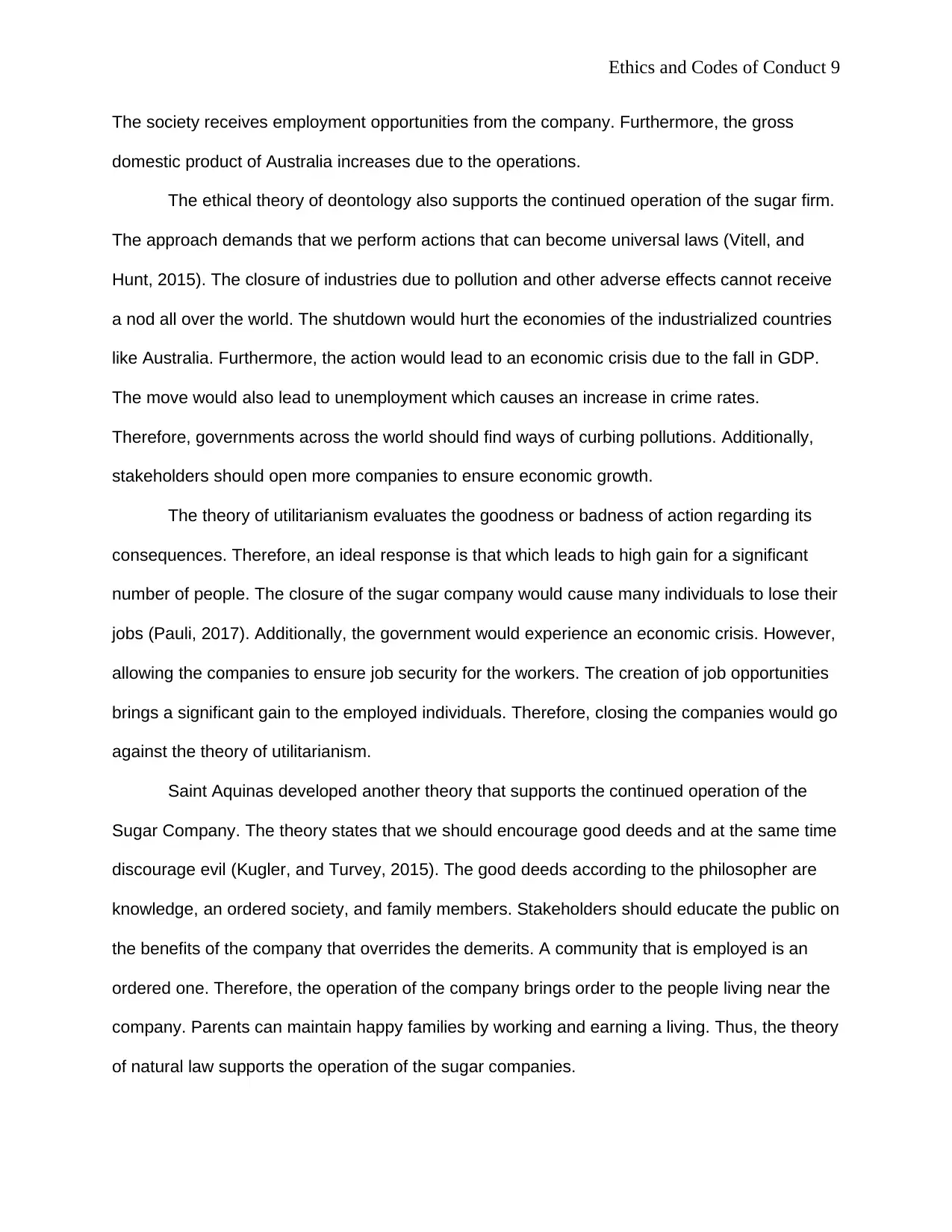
Ethics and Codes of Conduct 9
The society receives employment opportunities from the company. Furthermore, the gross
domestic product of Australia increases due to the operations.
The ethical theory of deontology also supports the continued operation of the sugar firm.
The approach demands that we perform actions that can become universal laws (Vitell, and
Hunt, 2015). The closure of industries due to pollution and other adverse effects cannot receive
a nod all over the world. The shutdown would hurt the economies of the industrialized countries
like Australia. Furthermore, the action would lead to an economic crisis due to the fall in GDP.
The move would also lead to unemployment which causes an increase in crime rates.
Therefore, governments across the world should find ways of curbing pollutions. Additionally,
stakeholders should open more companies to ensure economic growth.
The theory of utilitarianism evaluates the goodness or badness of action regarding its
consequences. Therefore, an ideal response is that which leads to high gain for a significant
number of people. The closure of the sugar company would cause many individuals to lose their
jobs (Pauli, 2017). Additionally, the government would experience an economic crisis. However,
allowing the companies to ensure job security for the workers. The creation of job opportunities
brings a significant gain to the employed individuals. Therefore, closing the companies would go
against the theory of utilitarianism.
Saint Aquinas developed another theory that supports the continued operation of the
Sugar Company. The theory states that we should encourage good deeds and at the same time
discourage evil (Kugler, and Turvey, 2015). The good deeds according to the philosopher are
knowledge, an ordered society, and family members. Stakeholders should educate the public on
the benefits of the company that overrides the demerits. A community that is employed is an
ordered one. Therefore, the operation of the company brings order to the people living near the
company. Parents can maintain happy families by working and earning a living. Thus, the theory
of natural law supports the operation of the sugar companies.
The society receives employment opportunities from the company. Furthermore, the gross
domestic product of Australia increases due to the operations.
The ethical theory of deontology also supports the continued operation of the sugar firm.
The approach demands that we perform actions that can become universal laws (Vitell, and
Hunt, 2015). The closure of industries due to pollution and other adverse effects cannot receive
a nod all over the world. The shutdown would hurt the economies of the industrialized countries
like Australia. Furthermore, the action would lead to an economic crisis due to the fall in GDP.
The move would also lead to unemployment which causes an increase in crime rates.
Therefore, governments across the world should find ways of curbing pollutions. Additionally,
stakeholders should open more companies to ensure economic growth.
The theory of utilitarianism evaluates the goodness or badness of action regarding its
consequences. Therefore, an ideal response is that which leads to high gain for a significant
number of people. The closure of the sugar company would cause many individuals to lose their
jobs (Pauli, 2017). Additionally, the government would experience an economic crisis. However,
allowing the companies to ensure job security for the workers. The creation of job opportunities
brings a significant gain to the employed individuals. Therefore, closing the companies would go
against the theory of utilitarianism.
Saint Aquinas developed another theory that supports the continued operation of the
Sugar Company. The theory states that we should encourage good deeds and at the same time
discourage evil (Kugler, and Turvey, 2015). The good deeds according to the philosopher are
knowledge, an ordered society, and family members. Stakeholders should educate the public on
the benefits of the company that overrides the demerits. A community that is employed is an
ordered one. Therefore, the operation of the company brings order to the people living near the
company. Parents can maintain happy families by working and earning a living. Thus, the theory
of natural law supports the operation of the sugar companies.
⊘ This is a preview!⊘
Do you want full access?
Subscribe today to unlock all pages.

Trusted by 1+ million students worldwide
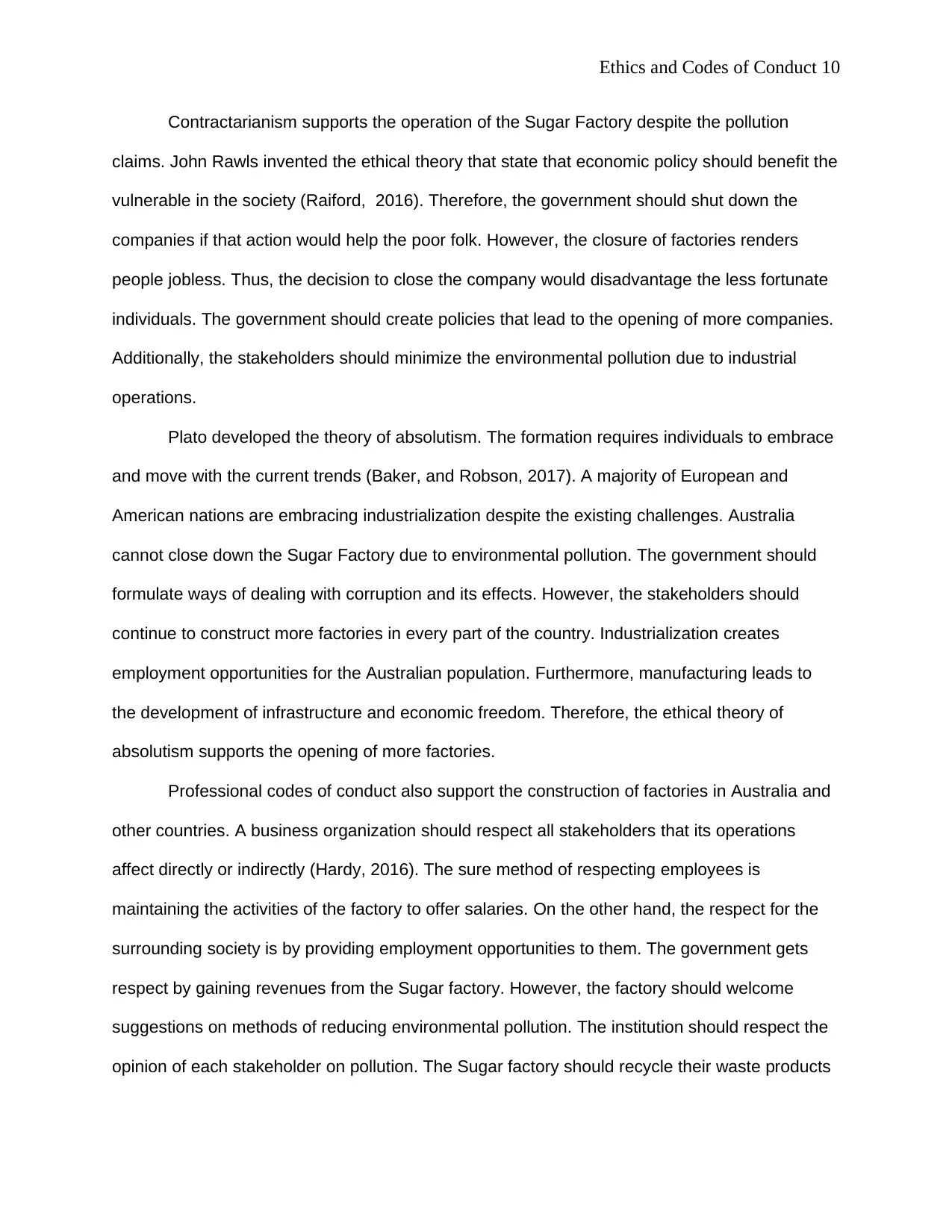
Ethics and Codes of Conduct 10
Contractarianism supports the operation of the Sugar Factory despite the pollution
claims. John Rawls invented the ethical theory that state that economic policy should benefit the
vulnerable in the society (Raiford, 2016). Therefore, the government should shut down the
companies if that action would help the poor folk. However, the closure of factories renders
people jobless. Thus, the decision to close the company would disadvantage the less fortunate
individuals. The government should create policies that lead to the opening of more companies.
Additionally, the stakeholders should minimize the environmental pollution due to industrial
operations.
Plato developed the theory of absolutism. The formation requires individuals to embrace
and move with the current trends (Baker, and Robson, 2017). A majority of European and
American nations are embracing industrialization despite the existing challenges. Australia
cannot close down the Sugar Factory due to environmental pollution. The government should
formulate ways of dealing with corruption and its effects. However, the stakeholders should
continue to construct more factories in every part of the country. Industrialization creates
employment opportunities for the Australian population. Furthermore, manufacturing leads to
the development of infrastructure and economic freedom. Therefore, the ethical theory of
absolutism supports the opening of more factories.
Professional codes of conduct also support the construction of factories in Australia and
other countries. A business organization should respect all stakeholders that its operations
affect directly or indirectly (Hardy, 2016). The sure method of respecting employees is
maintaining the activities of the factory to offer salaries. On the other hand, the respect for the
surrounding society is by providing employment opportunities to them. The government gets
respect by gaining revenues from the Sugar factory. However, the factory should welcome
suggestions on methods of reducing environmental pollution. The institution should respect the
opinion of each stakeholder on pollution. The Sugar factory should recycle their waste products
Contractarianism supports the operation of the Sugar Factory despite the pollution
claims. John Rawls invented the ethical theory that state that economic policy should benefit the
vulnerable in the society (Raiford, 2016). Therefore, the government should shut down the
companies if that action would help the poor folk. However, the closure of factories renders
people jobless. Thus, the decision to close the company would disadvantage the less fortunate
individuals. The government should create policies that lead to the opening of more companies.
Additionally, the stakeholders should minimize the environmental pollution due to industrial
operations.
Plato developed the theory of absolutism. The formation requires individuals to embrace
and move with the current trends (Baker, and Robson, 2017). A majority of European and
American nations are embracing industrialization despite the existing challenges. Australia
cannot close down the Sugar Factory due to environmental pollution. The government should
formulate ways of dealing with corruption and its effects. However, the stakeholders should
continue to construct more factories in every part of the country. Industrialization creates
employment opportunities for the Australian population. Furthermore, manufacturing leads to
the development of infrastructure and economic freedom. Therefore, the ethical theory of
absolutism supports the opening of more factories.
Professional codes of conduct also support the construction of factories in Australia and
other countries. A business organization should respect all stakeholders that its operations
affect directly or indirectly (Hardy, 2016). The sure method of respecting employees is
maintaining the activities of the factory to offer salaries. On the other hand, the respect for the
surrounding society is by providing employment opportunities to them. The government gets
respect by gaining revenues from the Sugar factory. However, the factory should welcome
suggestions on methods of reducing environmental pollution. The institution should respect the
opinion of each stakeholder on pollution. The Sugar factory should recycle their waste products
Paraphrase This Document
Need a fresh take? Get an instant paraphrase of this document with our AI Paraphraser
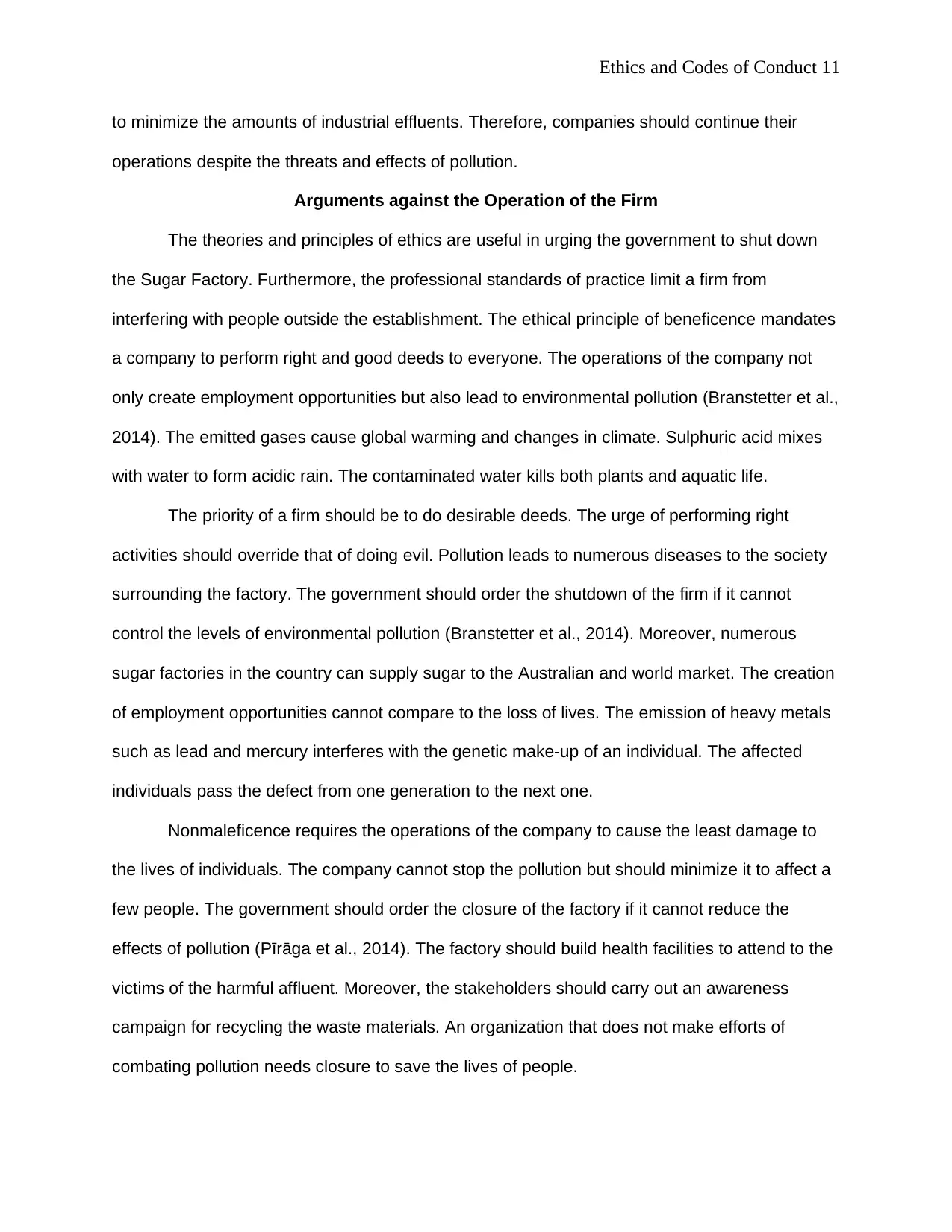
Ethics and Codes of Conduct 11
to minimize the amounts of industrial effluents. Therefore, companies should continue their
operations despite the threats and effects of pollution.
Arguments against the Operation of the Firm
The theories and principles of ethics are useful in urging the government to shut down
the Sugar Factory. Furthermore, the professional standards of practice limit a firm from
interfering with people outside the establishment. The ethical principle of beneficence mandates
a company to perform right and good deeds to everyone. The operations of the company not
only create employment opportunities but also lead to environmental pollution (Branstetter et al.,
2014). The emitted gases cause global warming and changes in climate. Sulphuric acid mixes
with water to form acidic rain. The contaminated water kills both plants and aquatic life.
The priority of a firm should be to do desirable deeds. The urge of performing right
activities should override that of doing evil. Pollution leads to numerous diseases to the society
surrounding the factory. The government should order the shutdown of the firm if it cannot
control the levels of environmental pollution (Branstetter et al., 2014). Moreover, numerous
sugar factories in the country can supply sugar to the Australian and world market. The creation
of employment opportunities cannot compare to the loss of lives. The emission of heavy metals
such as lead and mercury interferes with the genetic make-up of an individual. The affected
individuals pass the defect from one generation to the next one.
Nonmaleficence requires the operations of the company to cause the least damage to
the lives of individuals. The company cannot stop the pollution but should minimize it to affect a
few people. The government should order the closure of the factory if it cannot reduce the
effects of pollution (Pīrāga et al., 2014). The factory should build health facilities to attend to the
victims of the harmful affluent. Moreover, the stakeholders should carry out an awareness
campaign for recycling the waste materials. An organization that does not make efforts of
combating pollution needs closure to save the lives of people.
to minimize the amounts of industrial effluents. Therefore, companies should continue their
operations despite the threats and effects of pollution.
Arguments against the Operation of the Firm
The theories and principles of ethics are useful in urging the government to shut down
the Sugar Factory. Furthermore, the professional standards of practice limit a firm from
interfering with people outside the establishment. The ethical principle of beneficence mandates
a company to perform right and good deeds to everyone. The operations of the company not
only create employment opportunities but also lead to environmental pollution (Branstetter et al.,
2014). The emitted gases cause global warming and changes in climate. Sulphuric acid mixes
with water to form acidic rain. The contaminated water kills both plants and aquatic life.
The priority of a firm should be to do desirable deeds. The urge of performing right
activities should override that of doing evil. Pollution leads to numerous diseases to the society
surrounding the factory. The government should order the shutdown of the firm if it cannot
control the levels of environmental pollution (Branstetter et al., 2014). Moreover, numerous
sugar factories in the country can supply sugar to the Australian and world market. The creation
of employment opportunities cannot compare to the loss of lives. The emission of heavy metals
such as lead and mercury interferes with the genetic make-up of an individual. The affected
individuals pass the defect from one generation to the next one.
Nonmaleficence requires the operations of the company to cause the least damage to
the lives of individuals. The company cannot stop the pollution but should minimize it to affect a
few people. The government should order the closure of the factory if it cannot reduce the
effects of pollution (Pīrāga et al., 2014). The factory should build health facilities to attend to the
victims of the harmful affluent. Moreover, the stakeholders should carry out an awareness
campaign for recycling the waste materials. An organization that does not make efforts of
combating pollution needs closure to save the lives of people.
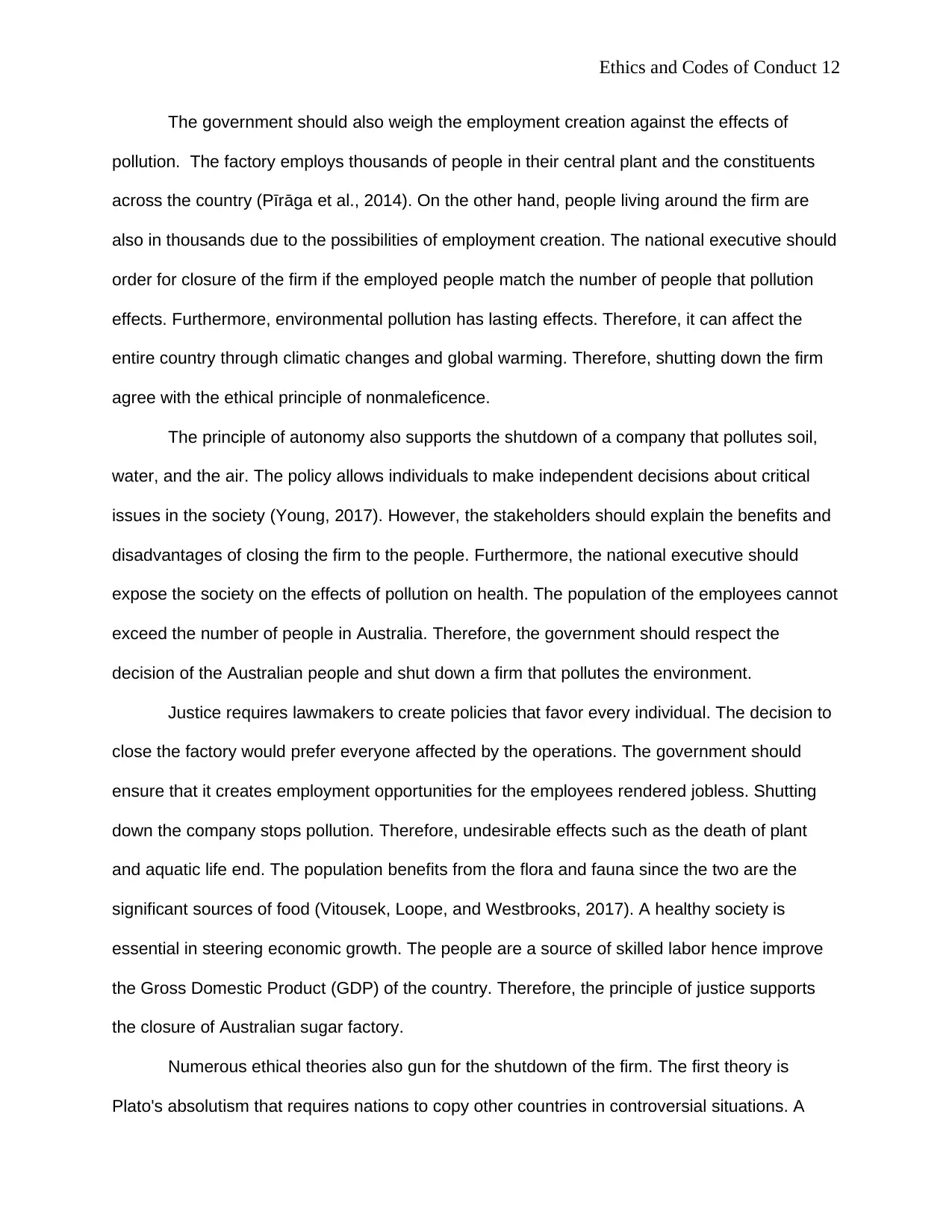
Ethics and Codes of Conduct 12
The government should also weigh the employment creation against the effects of
pollution. The factory employs thousands of people in their central plant and the constituents
across the country (Pīrāga et al., 2014). On the other hand, people living around the firm are
also in thousands due to the possibilities of employment creation. The national executive should
order for closure of the firm if the employed people match the number of people that pollution
effects. Furthermore, environmental pollution has lasting effects. Therefore, it can affect the
entire country through climatic changes and global warming. Therefore, shutting down the firm
agree with the ethical principle of nonmaleficence.
The principle of autonomy also supports the shutdown of a company that pollutes soil,
water, and the air. The policy allows individuals to make independent decisions about critical
issues in the society (Young, 2017). However, the stakeholders should explain the benefits and
disadvantages of closing the firm to the people. Furthermore, the national executive should
expose the society on the effects of pollution on health. The population of the employees cannot
exceed the number of people in Australia. Therefore, the government should respect the
decision of the Australian people and shut down a firm that pollutes the environment.
Justice requires lawmakers to create policies that favor every individual. The decision to
close the factory would prefer everyone affected by the operations. The government should
ensure that it creates employment opportunities for the employees rendered jobless. Shutting
down the company stops pollution. Therefore, undesirable effects such as the death of plant
and aquatic life end. The population benefits from the flora and fauna since the two are the
significant sources of food (Vitousek, Loope, and Westbrooks, 2017). A healthy society is
essential in steering economic growth. The people are a source of skilled labor hence improve
the Gross Domestic Product (GDP) of the country. Therefore, the principle of justice supports
the closure of Australian sugar factory.
Numerous ethical theories also gun for the shutdown of the firm. The first theory is
Plato's absolutism that requires nations to copy other countries in controversial situations. A
The government should also weigh the employment creation against the effects of
pollution. The factory employs thousands of people in their central plant and the constituents
across the country (Pīrāga et al., 2014). On the other hand, people living around the firm are
also in thousands due to the possibilities of employment creation. The national executive should
order for closure of the firm if the employed people match the number of people that pollution
effects. Furthermore, environmental pollution has lasting effects. Therefore, it can affect the
entire country through climatic changes and global warming. Therefore, shutting down the firm
agree with the ethical principle of nonmaleficence.
The principle of autonomy also supports the shutdown of a company that pollutes soil,
water, and the air. The policy allows individuals to make independent decisions about critical
issues in the society (Young, 2017). However, the stakeholders should explain the benefits and
disadvantages of closing the firm to the people. Furthermore, the national executive should
expose the society on the effects of pollution on health. The population of the employees cannot
exceed the number of people in Australia. Therefore, the government should respect the
decision of the Australian people and shut down a firm that pollutes the environment.
Justice requires lawmakers to create policies that favor every individual. The decision to
close the factory would prefer everyone affected by the operations. The government should
ensure that it creates employment opportunities for the employees rendered jobless. Shutting
down the company stops pollution. Therefore, undesirable effects such as the death of plant
and aquatic life end. The population benefits from the flora and fauna since the two are the
significant sources of food (Vitousek, Loope, and Westbrooks, 2017). A healthy society is
essential in steering economic growth. The people are a source of skilled labor hence improve
the Gross Domestic Product (GDP) of the country. Therefore, the principle of justice supports
the closure of Australian sugar factory.
Numerous ethical theories also gun for the shutdown of the firm. The first theory is
Plato's absolutism that requires nations to copy other countries in controversial situations. A
⊘ This is a preview!⊘
Do you want full access?
Subscribe today to unlock all pages.

Trusted by 1+ million students worldwide
1 out of 20
Related Documents
Your All-in-One AI-Powered Toolkit for Academic Success.
+13062052269
info@desklib.com
Available 24*7 on WhatsApp / Email
![[object Object]](/_next/static/media/star-bottom.7253800d.svg)
Unlock your academic potential
Copyright © 2020–2025 A2Z Services. All Rights Reserved. Developed and managed by ZUCOL.





